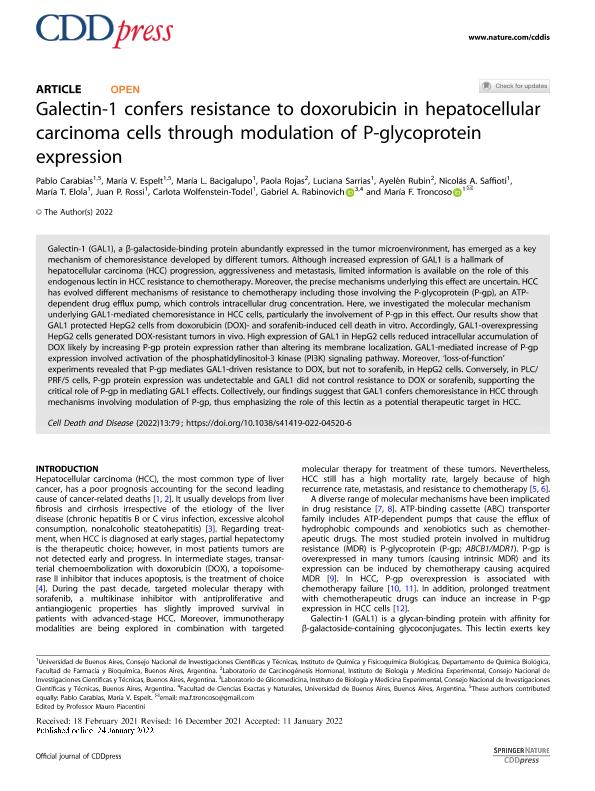Artículo
Galectin-1 confers resistance to doxorubicin in hepatocellular carcinoma cells through modulation of P-glycoprotein expression
Carabias, Pablo ; Espelt, Maria Victoria
; Espelt, Maria Victoria ; Bacigalupo, Maria Lorena
; Bacigalupo, Maria Lorena ; Rojas, Paola Andrea
; Rojas, Paola Andrea ; Sarrias, Luciana
; Sarrias, Luciana ; Rubin, Ayelen; Saffioti, Nicolas Andres
; Rubin, Ayelen; Saffioti, Nicolas Andres ; Elola, Maria Teresa
; Elola, Maria Teresa ; Rossi, Juan Pablo Francisco
; Rossi, Juan Pablo Francisco ; Wolfenstein Todel, Carlota; Rabinovich, Gabriel Adrián
; Wolfenstein Todel, Carlota; Rabinovich, Gabriel Adrián ; Troncoso, María Fernanda
; Troncoso, María Fernanda
 ; Espelt, Maria Victoria
; Espelt, Maria Victoria ; Bacigalupo, Maria Lorena
; Bacigalupo, Maria Lorena ; Rojas, Paola Andrea
; Rojas, Paola Andrea ; Sarrias, Luciana
; Sarrias, Luciana ; Rubin, Ayelen; Saffioti, Nicolas Andres
; Rubin, Ayelen; Saffioti, Nicolas Andres ; Elola, Maria Teresa
; Elola, Maria Teresa ; Rossi, Juan Pablo Francisco
; Rossi, Juan Pablo Francisco ; Wolfenstein Todel, Carlota; Rabinovich, Gabriel Adrián
; Wolfenstein Todel, Carlota; Rabinovich, Gabriel Adrián ; Troncoso, María Fernanda
; Troncoso, María Fernanda
Fecha de publicación:
01/2022
Editorial:
Springer
Revista:
Cell Death and Disease
ISSN:
2041-4889
Idioma:
Inglés
Tipo de recurso:
Artículo publicado
Clasificación temática:
Resumen
Galectin-1 (GAL1), a β-galactoside-binding protein abundantly expressed in the tumor microenvironment, has emerged as a key mechanism of chemoresistance developed by different tumors. Although increased expression of GAL1 is a hallmark of hepatocellular carcinoma (HCC) progression, aggressiveness and metastasis, limited information is available on the role of this endogenous lectin in HCC resistance to chemotherapy. Moreover, the precise mechanisms underlying this effect are uncertain. HCC has evolved different mechanisms of resistance to chemotherapy including those involving the P-glycoprotein (P-gp), an ATP-dependent drug efflux pump, which controls intracellular drug concentration. Here, we investigated the molecular mechanism underlying GAL1-mediated chemoresistance in HCC cells, particularly the involvement of P-gp in this effect. Our results show that GAL1 protected HepG2 cells from doxorubicin (DOX)- and sorafenib-induced cell death in vitro. Accordingly, GAL1-overexpressing HepG2 cells generated DOX-resistant tumors in vivo. High expression of GAL1 in HepG2 cells reduced intracellular accumulation of DOX likely by increasing P-gp protein expression rather than altering its membrane localization. GAL1-mediated increase of P-gp expression involved activation of the phosphatidylinositol-3 kinase (PI3K) signaling pathway. Moreover, ‘loss-of-function’ experiments revealed that P-gp mediates GAL1-driven resistance to DOX, but not to sorafenib, in HepG2 cells. Conversely, in PLC/PRF/5 cells, P-gp protein expression was undetectable and GAL1 did not control resistance to DOX or sorafenib, supporting the critical role of P-gp in mediating GAL1 effects. Collectively, our findings suggest that GAL1 confers chemoresistance in HCC through mechanisms involving modulation of P-gp, thus emphasizing the role of this lectin as a potential therapeutic target in HCC.
Palabras clave:
GLYCOBIOLOGY
,
LIVER CANCER
,
DOXORRUBICIN
Archivos asociados
Licencia
Identificadores
Colecciones
Articulos(IBYME)
Articulos de INST.DE BIOLOGIA Y MEDICINA EXPERIMENTAL (I)
Articulos de INST.DE BIOLOGIA Y MEDICINA EXPERIMENTAL (I)
Articulos(IQUIFIB)
Articulos de INST.DE QUIMICA Y FISICO-QUIMICA BIOLOGICAS "PROF. ALEJANDRO C. PALADINI"
Articulos de INST.DE QUIMICA Y FISICO-QUIMICA BIOLOGICAS "PROF. ALEJANDRO C. PALADINI"
Articulos(SEDE CENTRAL)
Articulos de SEDE CENTRAL
Articulos de SEDE CENTRAL
Citación
Carabias, Pablo; Espelt, Maria Victoria; Bacigalupo, Maria Lorena; Rojas, Paola Andrea; Sarrias, Luciana; et al.; Galectin-1 confers resistance to doxorubicin in hepatocellular carcinoma cells through modulation of P-glycoprotein expression; Springer; Cell Death and Disease; 13; 1; 1-2022; 79-93
Compartir
Altmétricas



